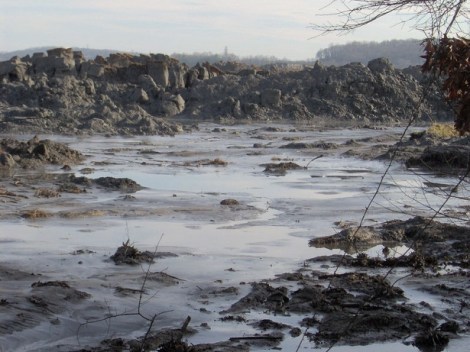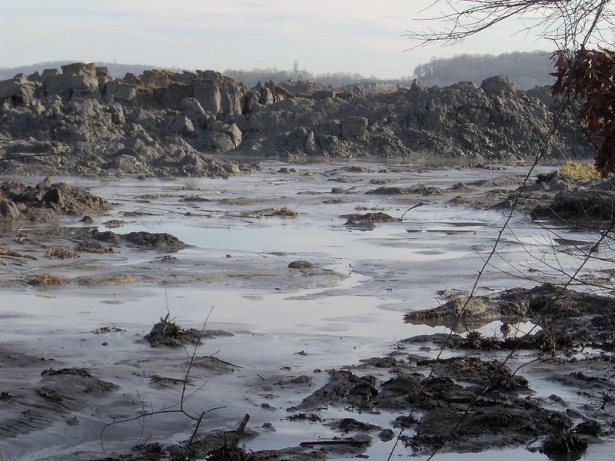It seems like a decent bet that the Prairie State Energy Campus, a massive coal plant in southern Illinois that just started operation in June, is at the tail end of a long trend. There will be more coal plants, to be sure, but I’d be willing to bet there won’t be many more at the scale of Prairie State. So it’s only fitting that its debut be marked by broken promises and threats.

Coal ash, in its uncontained form, seen in Tennessee.
Midwest Energy News has the story. In 2005, while seeking a permit to begin construction, the company told the local zoning board that the tons of ash produced by burning coal would be shipped out of the county to permitted disposal sites. That was good enough for the county. Zoning variance granted.
About a month ago, shortly after the first generating unit went live, Prairie State Generating Company paid county officials another visit.
On June 26, the Washington County Board met behind closed doors with the lawyer from Prairie State and passed an amendment to an ordinance that granted the company permission to build a 720-acre coal ash landfill on flat farmland near the controversial Marissa, Illinois, plant.
The amendment allowed the company to bypass the normal zoning process, which would have involved public hearings, and negotiate a contract for the landfill with the county—all out of the public eye.
Why did the board agree?
“Our attorneys and powers that be told us there was a good chance if we did not negotiate they could go ahead and do it on their own,” he said. “So if we tried to fight, nothing would be gained other than a big bill over court fees.”
So did Prairie State actually threaten to sue Washington County if they failed to approve the landfill, and if so, on what grounds?
“That was never explained to me,” said Brent Schorfheide, another member of the Washington County Board. [Board member Gary] Suedmeyer said he was not at liberty to say because of the closed proceedings. And when asked that question, Prairie State spokeswoman Ashlie Kuehn responded, in an emailed statement, “no comment.”
Democracy in action.
Coal ash is unpleasant stuff, as residents of Harriman, Tenn., can attest. In 2008, a pond containing coal ash overflowed, sending billions of gallons of a coal-ash slurry downstream, destroying or damaging more than 50 homes. The dusty residue “contains arsenic, mercury, lead, and over a dozen other heavy metals, many of them toxic” — not the sort of thing you want in your house or your lungs.
Unlike in Tennessee, Prairie State plans to contain the ash in a dry form, periodically wetting it in hopes that tames the dust. Eventually, they expect the pile of ash to reach 250 feet — the height of a 25-story building.
At least Prairie State explained why it changed its mind about promising to house the ash in a remote location.
At the June 26 meeting, … [local resident Dale] Wojtkowski mentioned that Prairie State’s president had promised under oath in 2005 that there would be no coal ash disposed of in Washington County.
“It just kind of amazed me the answer I got: that it was because the people who owned the property were unwilling to sell it at the time,” Wojtkowski said.
And as everyone knows, if a situation changes in any small way, sworn oaths are automatically called off. It’s what makes our system great.
Congratulations, Prairie State. You’ve done your best to ensure that the coal era is remembered in its most accurate light: unconcerned about the impacts on people, and putting profits first.




